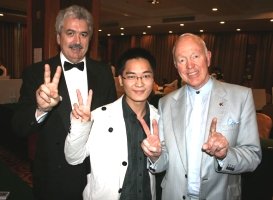Shattering his own record by over 100 numbers, 21-year-old Wang Feng, a Chinese National, recalled 300 of 400 spoken numbers in the 2011 World Memory Championships held in China last December. In addition, he accumulated 8477 points overall, and broke two other world records in the 20th annual event to win the event for the second year in a row.
As a result of his win he gets additional placement in the Guinness Book of World Records and the Book of Mental World Records for not only breaking the world record in the spoken numbers, but for memorizing 500 numbers in five minutes; and 2660 numbers memorized in an hour.
In 2010, Feng won the title by memorizing a pack of 52 playing cards in 24 seconds. He became the first Chinese person to win the world title after two days of intense competition against some real heavyweights.
“I’ve spent three months preparing for this championship,” he said. “Each day I spend 5-6 hours practicing. Actually, each year, I spend two to three months preparing for competitions.”
Memory Championships are not athletic competitions, or even exciting spectator sports, but they are intense brain games, and competitors do some amazing memory feats. Attendees from 20 countries competed in several memory games, including memorizing 30 packs of playing cards in one hour; recalling 400 numbers spoken in one second intervals; and naming over 90 people in 14 minutes.
Young people seem to have an edge in this type of competition. This year’s winner in the face and names competition was a 16-year-old girl from Indonesia. Wang Feng, the 21-year-old student from Wuhan Univerisity, however, stole the show with his three world record breakers.

According to past winners, the tournament, now in its 20th year, has been growing steadily – and consistently gotten harder. It isn’t just book smarts, they say, but coming up with more creative ways to retain information.
Weng told CRI reporter Seth Coleman that anyone can have an amazing memory through practice. He began his interest in memory training in 2009 when he joined a memory club at school, where he studies land resource management. “I got to know about mnemonics by accident. When I heard there was a memory club, I joined it to improve my memory because it wasn’t so good back then.”
He found he had a talent for memory training, with the help of a world-class teacher. “After just two week of training, I was already better than some who had been training for months.”
Soon he was traveling with his teacher to different memory events to compete. “I competed in some memory competitions in London and China. Then I became the world champion, that’s when people started to notice me.”
He told the reporter he has no special talent, except maybe for hard work and attention to detail. Anyone can do the techniques that can make these feats possible. “I just had a normal memory as a child…”
“The system I use isn’t different from what others use. I just made some modifications based on the original one,” he said. He reports that in order to memorize a deck of cards he gives each card a two-digit number, and then turns that number into an image because images are easier to remember. “First, each of the suits have a number, one to four. A spade is pointing upwards, so I think of it as one; A heart has two rounded sides so it’s two; A club has three cloves so it’s three. And a diamond has 4 edges, so it’s 4.”
By using this system, the 7 of clubs becomes 37, 3 for clubs, and 7 for 7. And 4 of hearts becomes 24 with 2 for hearts and 4 for 4. After that, an image is associated with each number. For Wang Feng, 37 is a chicken, because when spoken in Chinese it sounds like chicken. And 24 is a clock, because there’s 24 hours in a day.
Placing the images in a familiar location is the next step. We are good are remembering places and layouts of things, and through the use of mnemonics we can trick our brains into storing the data we want. In order to remember the order of cards we just put the cards in places we know. “The place could be where I live, a classroom, supermarket, park – somewhere I’m familiar with, he says.”
Wang Feng says he has no plans to compete in the 2012 championship. He want to focus on training others, so he has been speaking around China, and hopes to open a training center to teach students how to improve their memory for school and tests.
“My life is easier now that I know mnemonics. It’s really helpful for remembering names and details – and things from books I read. I don’t need a pen anymore.”
About the author:
Ron White is a two-time U.S.A. Memory Champion and memory training expert. As a memory keynote speaker he travels the world to speak before large groups or small company seminars, demonstrating his memory skills and teaching others how to improve their memory, and how important a good memory is in all phases of your life. His CDs and memory products are also available online at BrainAthlete.com.
Sources:
World Memory Championships: http://www.worldmemorychampionships.com/
Yahoo Games: 21-year-old Memory Champ breaks records: http://games.yahoo.com/blogs/plugged-in/21-old-memory-champ-breaks-records-193703911.html
CRI English.com – Memory Champion Wang Feng: http://english.cri.cn/7146/2012/05/11/2702s698869.htm


